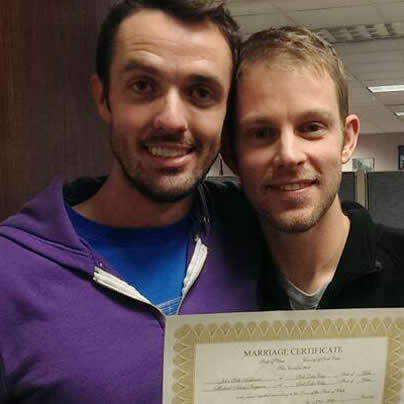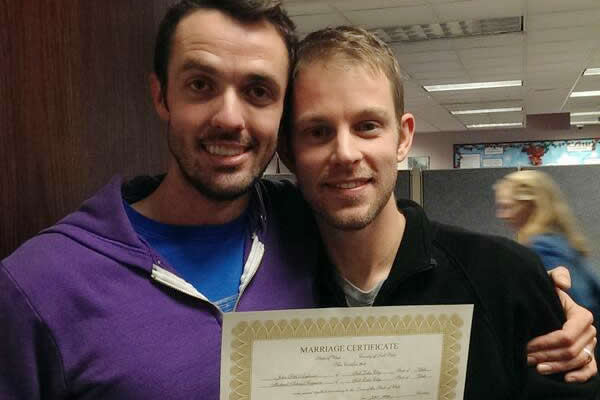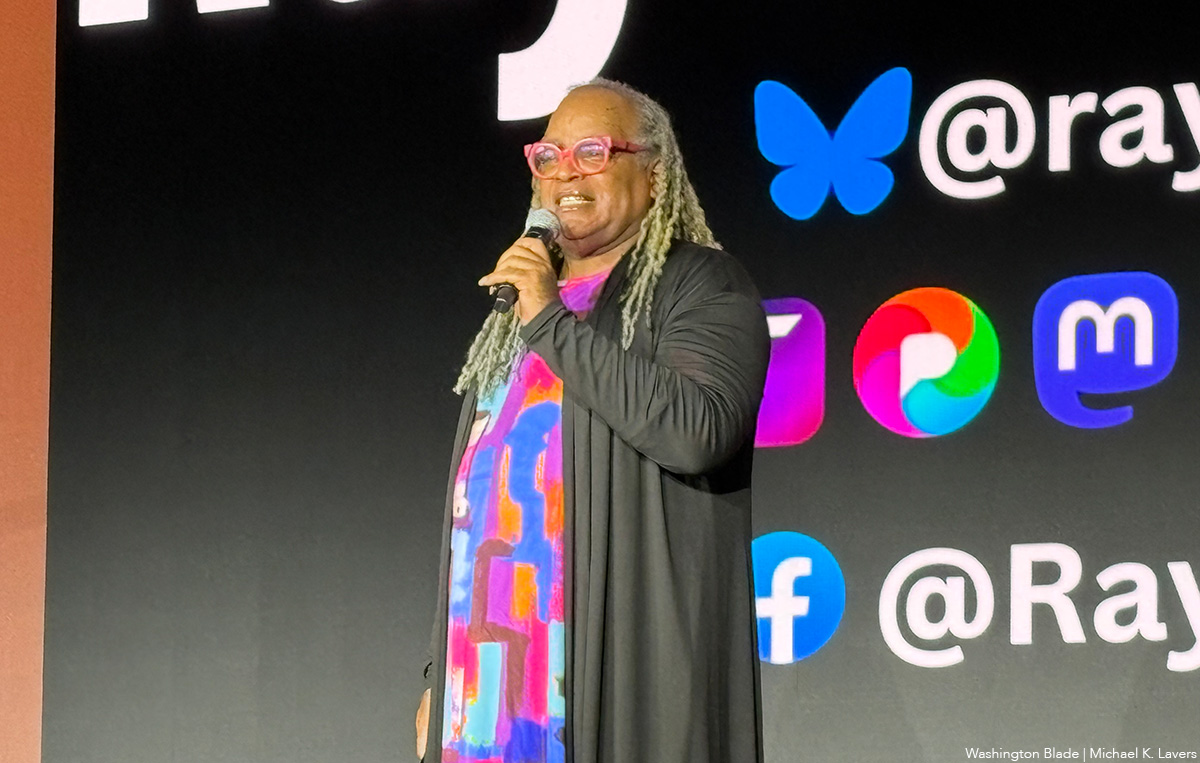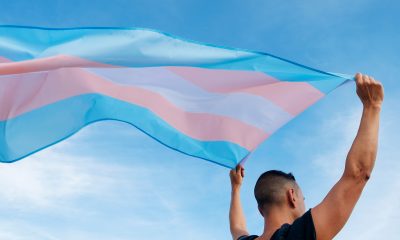News
Utah judge legalizes same-sex marriage
No stay in decision means gay couples can apply for licenses immediately


A federal judge in Utah has struck down the state’s ban on same-sex marriage. Michael Ferguson (left) and Seth Anderson were married in Salt Lake City. (Photo courtesy of Seth Anderson)
A federal judge in Utah has ruled the state’s constitutional ban on same-sex nuptials is unconstitutional, enabling gay couples in the state to apply for marriage licenses immediately.
U.S. District Judge Robert Shelby, an Obama appointee, issued 53-page decision on Friday, determining the state’s ban on same-sex marriage violates gay couples’ rights under the 14th Amendment of the U.S. Constitution.
“Applying the law as it is required to do, the court holds that Utah’s prohibition on same- sex marriage conflicts with the United States Constitution’s guarantees of equal protection and due process under the law,” Shelby writes. “The State’s current laws deny its gay and lesbian citizens their fundamental right to marry and, in so doing, demean the dignity of these same-sex couples for no rational reason. Accordingly, the court finds that these laws are unconstitutional.”
The decision — handed down in response to a request for summary judgment from all parties involved — makes Utah the 18th state in the country where same-sex marriage is legal. No stay was placed in the decision, so gay couples can apply for marriage licenses immediately.
One such couple, Seth Anderson and his new spouse, documented their application for a marriage license in Utah on Twitter within an hour after the ruling.
Me and my new husband!! My polygamous Mormon great grandparents would be so proud! pic.twitter.com/82xyh9GJoS
— Seth Anderson (@jsethanderson) December 20, 2013
Gov. Gary Herbert (R-Utah) opposes same-sex marriage and defended the ban against the litigation in court, so is expected to appeal the decision to the U.S. Tenth Circuit Court of Appeals. Herbert, along with Acting Attorney General Brian Tarbet, filed a notice of appeal with the district court following the ruling.
In a statement, Tarbet said his office is requesting an emergency stay in anticipation of an appeal to higher court.
“The federal district court’s ruling that same-sex marriage is a fundamental right has never been established in any previous case in the 10th Circuit,” Tarbet said. “The state is requesting an emergency stay pending the filing of an appeal. The Attorney General’s Office will continue reviewing the ruling in detail until an appeal is filed to support the constitutional amendment passed by the citizens of Utah.”
Earlier, Herbert said he’s “disappointed” with the judge’s ruling and is examining ways to keep the ban to same-sex marriage in place within the state.
“I am very disappointed an activist federal judge is attempting to override the will of the people of Utah,” Herbert said. “I am working with my legal counsel and the acting Attorney General to determine the best course to defend traditional marriage within the borders of Utah.”
The ruling marks the second time a court has struck down a ban on same-sex marriage that was constitutional and not statutory. The first was the 2010 ruling against California’s Proposition 8. It’s also the first time a court struck down a constitutional ban on same-sex marriage in the aftermath of the U.S. Supreme Court’s decisions on Prop 8 and Section 3 of the Defense of Marriage Act.
Shannon Minter, legal director for the National Center for Lesbian Rights, told the Washington Blade the decision is “a huge win” — not just for same-sex couples in Utah, but the entire country.
“To have such a historic ruling take place in Utah speaks volumes about our country’s trajectory from discrimination to acceptance and support for same-sex couples and their families,” Minter said.
The challenge to the law was brought by three Utah couples – Derek Kitchen and Moudi Sbeity; Karen Archer and Kate Call; and Laurie Wood and Kody Partridge — who were represented by the law firm of Magleby & Greenwood. The couples either wished to be married in Utah or were legally married elsewhere and wanted their home state to recognize their marriage.
The decision makes heavy use of the Supreme Court decision against DOMA as part of the reasoning striking down Utah’s ban on same-sex marriage. Ironically, Shelby draws on the dissent of U.S. Associate Justice Antonin Scalia, who wrote it would be “easy” for judges to apply the DOMA decision to state laws banning same-sex marriage.
“The court agrees with Justice Scalia’s interpretation of Windsor and finds that the important federalism concerns at issue here are nevertheless insufficient to save a state-law prohibition that denies the Plaintiffs their rights to due process and equal protection under the law,” Shelby writes.
Utah voters in 2004 approved the state constitutional ban on same-sex marriage, known as Amendment 3, by a margin of 65.8 percent to 33.2 percent. It bans both same-sex marriage and marriage-like unions.
Shelby writes the issue of same-sex marriage is “politically charged in the current climate” and more so because the current law is in place as a result of referendum. However, Shelby rules that even a vote of the people can’t defy the U.S. Constitution.
“It is only under exceptional circumstances that a court interferes with such action,” Shelby writes. “But the legal issues presented in this lawsuit do not depend on whether Utah’s laws were the result of its legislature or a referendum, or whether the laws passed by the widest or smallest of margins. The question presented here depends instead on the Constitution itself, and on the interpretation of that document contained in binding precedent from the Supreme Court and the Tenth Circuit Court of Appeals.”
The judge concludes by drawing on the 1966 case of Loving v. Virginia, which struck down state bans on interracial marriage throughout the country, saying the defense in favor of these bans 50 years ago is the same the state provided for Utah’s ban on same-sex marriage.
“For the reasons discussed above, the court finds these arguments as unpersuasive as the Supreme Court found them fifty years ago,” Shelby writes. “Anti-miscegenation laws in Virginia and elsewhere were designed to, and did, deprive a targeted minority of the full measure of human dignity and liberty by denying them the freedom to marry the partner of their choice. Utah’s Amendment 3 achieves the same result.”
Marc Solomon, national campaign director for the LGBT group Freedom to Marry, said ruling represents a historic end to a year of tremendous success for the marriage equality movement.
“The federal district judge has done the right thing by affirming that marriage is a fundamental freedom for all people, gay and non-gay – for all of us who believe in liberty and fairness,” Solomon said. “We hope that officials implement this ruling statewide. As same-sex couples celebrate their weddings, more people will see that sharing in the freedom to marry helps families and harms no one.”
Senegal
A dozen Senegalese men arrested for ‘unnatural acts’
Popular journalist and musician among those taken into custody

Senegalese police have charged a dozen men with committing “unnatural acts.”
The New York Times reported Pape Cheikh Diallo, a popular television reporter, and Djiby Dramé, a musician, are among the men who authorities arrested. They appeared in court in Dakar, the Senegalese capital, on Monday.
Le Soleil, a Senegalese newspaper, reported authorities arrested the men on Feb. 6 “for intentional transmission of HIV, unnatural acts, criminal conspiracy, and endangering others.” The newspaper further notes the men have been placed in “pre-trial detention.”
Senegal is among the countries in which consensual same-sex sexual relations remain criminalized.
Police in Kaolack, a town that is roughly 135 miles southeast of Dakar, in 2015 arrested 11 people who allegedly engaged in same-sex sexual acts during “a celebration of a gay marriage.” The National Assembly in 2021 rejected a bill that would have further criminalized homosexuality in the country.
Local
Local LGBTQ groups, activists to commemorate Black History Month
Rayceen Pendarvis to moderate Dupont Underground panel on Sunday

LGBTQ groups in D.C. and elsewhere plan to use Black History Month as an opportunity to commemorate and celebrate Black lives and experiences.
Team Rayceen Productions has no specific events planned, but co-founder Rayceen Pendarvis will attend many functions around D.C. this month.
Pendarvis, a longtime voice in the LGBTQ community in D.C. will be moderating a panel at Dupont Underground on Sunday. The event, “Every (Body) Wants to Be a Showgirl,” will feature art from Black burlesque artists from around the country. Pendarvis on Feb. 23 will attend the showing of multimedia play at the Lincoln Theatre that commemorates the life of James Baldwin.
Equality Virginia plans to prioritize Black voices through a weekly online series, and community-based story telling. The online digital series will center Black LGBTQ voices, specifically trailblazers and activists, and contemporary Black queer and transgender people.
Narissa Rahaman, Equality Virginia’s executive director, stressed the importance of the Black queer community to the overall Pride movement, and said “Equality Virginia is proud to center those voices in our work this month and beyond.”
The Capital Pride Alliance, which hosts Pride events in D.C., has an alliance with the Center for Black Equity, which brings Black Pride to D.C. over Memorial Day weekend. The National LGBTQ Task Force has no specific Black History Month events planned, but plans to participate in online collaborations.
Cathy Renna, the Task Force’s director of communications, told the Washington Blade the organization remains committed to uplifting Black voices. “Our priority is keeping this at the forefront everyday,” she said.
The D.C. LGBTQ+ Community Center is also hosting a series of Black History Month events.
The D.C. Public Library earlier this year launched “Freedom and Resistance,” an exhibition that celebrates Black History Month and Martin Luther King Jr. It will remain on display until the middle of March at the Martin Luther King Jr. Memorial Library at 901 G St., N.W.
District of Columbia
U.S. Attorney’s Office drops hate crime charge in anti-gay assault
Case remains under investigation and ‘further charges’ could come

D.C. police announced on Feb. 9 that they had arrested two days earlier on Feb. 7 a Germantown, Md., man on a charge of simple assault with a hate crime designation after the man allegedly assaulted a gay man at 14th and Q Streets, N.W., while using “homophobic slurs.”
But D.C. Superior Court records show that prosecutors with the Office of the U.S. Attorney for D.C., which prosecutes D.C. violent crime cases, charged the arrested man only with simple assault without a hate crime designation.
In response to a request by the Washington Blade for the reason why the hate crime designation was dropped, a spokesperson for the U.S. Attorney’s office provided this response: “We continue to investigate this matter and make no mistake: should the evidence call for further charges, we will not hesitate to charge them.”
In a statement announcing the arrest in this case, D.C. police stated, “On Saturday, February 7, 2026, at approximately 7:45 p.m. the victim and suspect were in the 1500 block of 14th Street, Northwest. The suspect requested a ‘high five’ from the victim. The victim declined and continued walking,” the statement says.
“The suspect assaulted the victim and used homophobic slurs,” the police statement continues. “The suspect was apprehended by responding officers.”
It adds that 26-year-old Dean Edmundson of Germantown, Md. “was arrested and charged with Simple Assault (Hate/Bias).” The statement also adds, “A designation as a hate crime by MPD does not mean that prosecutors will prosecute it as a hate crime.”
Under D.C.’s Bias Related Crime Act of 1989, penalties for crimes motivated by prejudice against individuals based on race, religion, sexual orientation, gender identity, disability, and homelessness can be enhanced by a court upon conviction by one and a half times greater than the penalty of the underlying crime.
Prosecutors in the past both in D.C. and other states have said they sometimes decide not to include a hate crime designation in assault cases if they don’t think the evidence is sufficient to obtain a conviction by a jury. In some instances, prosecutors have said they were concerned that a skeptical jury might decide to find a defendant not guilty of the underlying assault charge if they did not believe a motive of hate was involved.
A more detailed arrest affidavit filed by D.C. police in Superior Court appears to support the charge of a hate crime designation.
“The victim stated that they refused to High-Five Defendant Edmondson, which, upon that happening, Defendant Edmondson started walking behind both the victim and witness, calling the victim, “bald, ugly, and gay,” the arrest affidavit states.
“The victim stated that upon being called that, Defendant Edmundson pushed the victim with both hands, shoving them, causing the victim to feel the force of the push,” the affidavit continues. “The victim stated that they felt offended and that they were also gay,” it says.



















